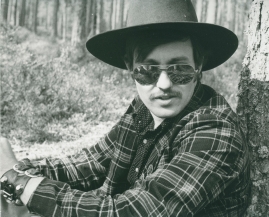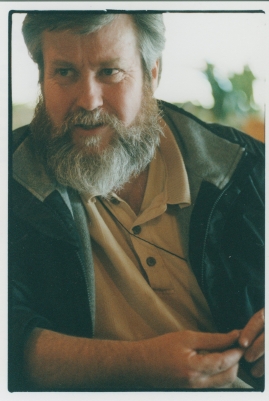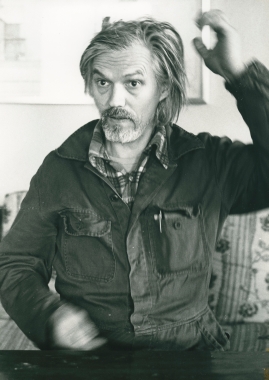Mats Helge Olsson
Table of contents
- Basic facts
- Links and resources
- Biography
- Awards
- Films
- Original work
- Soundtrack listing
- Groups
Basic facts
Media (2)
| Alternative names |
|
|---|---|
| Director |
|
| Producer |
|
| Show all films |
Biography
Swedish director, scriptwriter and producer. Born in Lidköping, Skaraborg.-He has been called "the Fassbinder of Lidköping" and has cited the populist director Ragnar Frisk as a role model. There is scarcely a more self-made filmmaker than Mats Helge Olsson in Swedish film history.As an under-achieving 16-year-old Olsson left school and set off for Stockholm with a dream of getting into films, but was met with indifference. Later on he had better luck in the rural province of Småland where he met the entrepreneur Big Bengt Erlandsson, who enthusiastically...
Biography
Swedish director, scriptwriter and producer. Born in Lidköping, Skaraborg.
-
He has been called "the Fassbinder of Lidköping" and has cited the populist director Ragnar Frisk as a role model. There is scarcely a more self-made filmmaker than Mats Helge Olsson in Swedish film history.
As an under-achieving 16-year-old Olsson left school and set off for Stockholm with a dream of getting into films, but was met with indifference. Later on he had better luck in the rural province of Småland where he met the entrepreneur Big Bengt Erlandsson, who enthusiastically gave him the green light to make a western. Olsson seized his chance and made two, Dead Man's Trail (I död mans spår) and The Frozen Star, the latter starring Carl-Gustaf Lindstedt and both of them filmed in Erlandsson's theme park High Chaparral in the mid 1970s. These films set in the American West with dialogue in Swedish, contemptuously referred to as "lingonberry western" (cf. "spaghetti western"), had a precedent in Börje Nyberg's Wild West Story (1964, also starring Lindstedt) but failed to inspire further films. Olsson then threw in his lot with the actor Per Oscarsson. In quick succession they completed a candid camera comedy (Heja Sverige, 'Go Sweden', 1979), a thriller (Tvingad att leva, 'Forced to Live', 1980) and a science fiction-film (Attentatet, 'The Attack', 1980).
However, the most grandiose of their joint efforts was Sverige åt svenskarna ('Sweden for the Swedes', 1980), a burlesque historical national epic with Oscarsson playing four parts, a 120-strong cast with many well-known names and roughly a thousand extras. Oscarsson was the director (according to Olsson as the result of the originally contracted Ingmar Bergman being forced to leave Sweden) and Olsson was the producer (although according to Oscarsson, Olsson actually directed for the most part). The result was a devastating fiasco with legal repercussions. Olsson was declared bankrupt and sentenced to four months in prison for false accounting. Even to this day, all of the extras are still waiting to be paid for their efforts.
Following this the increasingly autonomous Olsson made a comeback to Swedish screens in 1984 with The Ninja Mission, an early Swedish contribution to the action genre, one in which we had actually had little or no tradition. Panned by the Swedish critics, the film nonetheless enjoyed some international success. In the US it was screened at 50 New York cinemas simultaneously, and is reputed to have gone on to earn on between two and three hundred million Swedish kronor in a total of 56 countries - according to Olsson at least, who from this film onwards usually refers to himself as Mats Helge in the opening credits. In the years that followed he completed a number of works in the same or related genres, always filmed in his native town of Lidköping (which had to serve as Moscow and various American locations) always in English and usually with a cast and crew who had to wait for their payment. At the same time Olsson's film industry has acquired a certain reputation as a breeding ground for young and untried talents: the director Anders Nilsson began his career there, as did the actress Camilla Lundén and others. Veteran director Arne Mattsson was invited to make films in Lidköping and co-directed with Olsson his last film The Mad Bunch (1989), starring David Carradine.
But new technological advances such as cable television and its abundance of low-budget action brought increasing competition to the very area in which Olsson's productions resided, and judging from his (probably as yet incomplete) filmography, very little new work appears to have seen the light of day since the 1990s. And yet a younger generation of B-film fans now celebrate Mats Helge Olsson as a Swedish film rebel, passionately hunting down his work, which is increasingly difficult to access, in a variety of home cinema formats. Olsson himself has so far been unwilling to release his films on DVD, claiming that he "doesn't want to give the critics the chance of deriding him again". His admirers, nonetheless, remain ever hopeful.
Jan Lumholdt (2013)
(translated by Derek Jones)
Films
| Director |
|
|---|---|
| Screenplay |
|
| Story |
|
| Producer |
|
| Cast |
|
| Special Effects |
|
| Story |
|
| Executive Producer |
|



